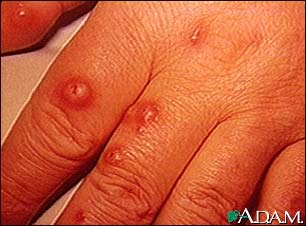Definition
Cryptococcosis is infection with Cryptococcus neoformans fungus.
Overview, Causes, & Risk Factors
Cryptococcus neoformans, the fungus that causes this disease, is ordinarily found in soil. It enters and infects the body through the lungs. Once inhaled, infection with cryptococcosis may go away on its own, remain in the lungs only, or spread throughout the body (disseminate).
Most cases are in people with a weakened immune system, such as those with HIV infection, taking high doses of corticosteroid medications, cancer chemotherapy, or who have Hodgkin’s disease.
In people with a normal immune system, the lung (pulmonary) form of the infection may have no symptoms. In people with impaired immune systems, the cryptococcus organism may spread to the brain.
Neurological (brain) symptoms begin gradually. Most people with this infection have meningoencephalitis (swelling and irritation of the brain and spinal cord) when they are diagnosed.
Cryptococcus is one of the most common life-threatening fungal infections in people with AIDS.
Pictures & Images
Cryptococcus, cutaneous on the hand

These are Cryptococcus skin lesions. Cryptococcus is a yeast (type of fungus) that seldom causes infection, but is considered opportunistic (it affects people with weakened immune systems). Cryptococcus is one of the more common life-threatening fungal infections in AIDS patients.
Cryptococcosis on the forehead

This is an example of Cryptococcus skin lesions on the forehead. Cryptococcus is a yeast (type of fungus) that seldom causes infection and is considered opportunistic (affecting individuals with weakened immune systems). Cryptococcus is one of the more common life-threatening fungal infections in AIDS patients.
-
Cryptococcosis : Overview, Causes, & Risk Factors
-
Cryptococcosis : Diagnosis & Tests
-
Cryptococcosis : Treatment



Review Date : 9/28/2008
Reviewed By : David C. Dugdale, III, MD, Professor of Medicine, Division of General Medicine, Department of Medicine, University of Washington School of Medicine; Jatin M. Vyas, MD, PhD, Instructor in Medicine, Harvard Medical School, Assistant in Medicine, Division of Infectious Disease, Massachusetts General Hospital. Also reviewed by David Zieve, MD, MHA, Medical Director, A.D.A.M., Inc.
